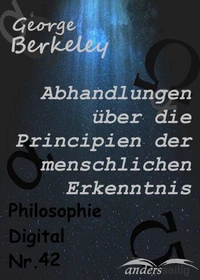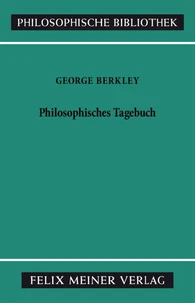A Treatise Concerning the Principles of Human Knowledge. Challenging Reality: A Deep Dive into Perception and Existence
Par :Formats :
Disponible dans votre compte client Decitre ou Furet du Nord dès validation de votre commande. Le format ePub est :
- Compatible avec une lecture sur My Vivlio (smartphone, tablette, ordinateur)
- Compatible avec une lecture sur liseuses Vivlio
- Pour les liseuses autres que Vivlio, vous devez utiliser le logiciel Adobe Digital Edition. Non compatible avec la lecture sur les liseuses Kindle, Remarkable et Sony
 , qui est-ce ?
, qui est-ce ?Notre partenaire de plateforme de lecture numérique où vous retrouverez l'ensemble de vos ebooks gratuitement
Pour en savoir plus sur nos ebooks, consultez notre aide en ligne ici
- Nombre de pages166
- FormatePub
- ISBN4057664163639
- EAN4057664163639
- Date de parution20/11/2019
- Protection num.Digital Watermarking
- Taille549 Ko
- Infos supplémentairesepub
- ÉditeurGOOD PRESS
Résumé
In "A Treatise Concerning the Principles of Human Knowledge, " George Berkeley presents a groundbreaking exploration of idealism, positing that existence is fundamentally tied to perception. His literary style is marked by a rigorous philosophical discourse, employing clear arguments to challenge the materialist views prevalent in 18th-century thought. Berkeley meticulously dismantles the notion of an objective reality independent of human perception, positing instead that all objects exist only as they are perceived, a thesis deeply interwoven with his famous dictum, 'Äòesse est percipi'Äô (to be is to be perceived).
This work is a critical reflection of the Enlightenment period'Äôs intellectual currents, engaging with contemporaries such as Descartes and Locke while paving the way for modern philosophical inquiry. Berkeley, an Irish philosopher and logician, was influenced by theological, metaphysical, and epistemological concerns throughout his career. His background in mathematics, along with his devotion to the Anglican Church, fostered his belief in the necessity of a divine perceiver to sustain reality.
His unique viewpoint was shaped by the intellectual milieu of his time and a desire to counteract growing skepticism about the divine and the nature of knowledge. For those intrigued by the complexities of perception and reality, Berkeley's treatise is an essential read. It challenges conventional wisdom and invites readers to reflect on the nature of existence itself. Whether you are a seasoned philosopher or a curious novice, Berkeley's insights offer profound implications for understanding the workings of the human mind and the fabric of reality.
This work is a critical reflection of the Enlightenment period'Äôs intellectual currents, engaging with contemporaries such as Descartes and Locke while paving the way for modern philosophical inquiry. Berkeley, an Irish philosopher and logician, was influenced by theological, metaphysical, and epistemological concerns throughout his career. His background in mathematics, along with his devotion to the Anglican Church, fostered his belief in the necessity of a divine perceiver to sustain reality.
His unique viewpoint was shaped by the intellectual milieu of his time and a desire to counteract growing skepticism about the divine and the nature of knowledge. For those intrigued by the complexities of perception and reality, Berkeley's treatise is an essential read. It challenges conventional wisdom and invites readers to reflect on the nature of existence itself. Whether you are a seasoned philosopher or a curious novice, Berkeley's insights offer profound implications for understanding the workings of the human mind and the fabric of reality.
In "A Treatise Concerning the Principles of Human Knowledge, " George Berkeley presents a groundbreaking exploration of idealism, positing that existence is fundamentally tied to perception. His literary style is marked by a rigorous philosophical discourse, employing clear arguments to challenge the materialist views prevalent in 18th-century thought. Berkeley meticulously dismantles the notion of an objective reality independent of human perception, positing instead that all objects exist only as they are perceived, a thesis deeply interwoven with his famous dictum, 'Äòesse est percipi'Äô (to be is to be perceived).
This work is a critical reflection of the Enlightenment period'Äôs intellectual currents, engaging with contemporaries such as Descartes and Locke while paving the way for modern philosophical inquiry. Berkeley, an Irish philosopher and logician, was influenced by theological, metaphysical, and epistemological concerns throughout his career. His background in mathematics, along with his devotion to the Anglican Church, fostered his belief in the necessity of a divine perceiver to sustain reality.
His unique viewpoint was shaped by the intellectual milieu of his time and a desire to counteract growing skepticism about the divine and the nature of knowledge. For those intrigued by the complexities of perception and reality, Berkeley's treatise is an essential read. It challenges conventional wisdom and invites readers to reflect on the nature of existence itself. Whether you are a seasoned philosopher or a curious novice, Berkeley's insights offer profound implications for understanding the workings of the human mind and the fabric of reality.
This work is a critical reflection of the Enlightenment period'Äôs intellectual currents, engaging with contemporaries such as Descartes and Locke while paving the way for modern philosophical inquiry. Berkeley, an Irish philosopher and logician, was influenced by theological, metaphysical, and epistemological concerns throughout his career. His background in mathematics, along with his devotion to the Anglican Church, fostered his belief in the necessity of a divine perceiver to sustain reality.
His unique viewpoint was shaped by the intellectual milieu of his time and a desire to counteract growing skepticism about the divine and the nature of knowledge. For those intrigued by the complexities of perception and reality, Berkeley's treatise is an essential read. It challenges conventional wisdom and invites readers to reflect on the nature of existence itself. Whether you are a seasoned philosopher or a curious novice, Berkeley's insights offer profound implications for understanding the workings of the human mind and the fabric of reality.












